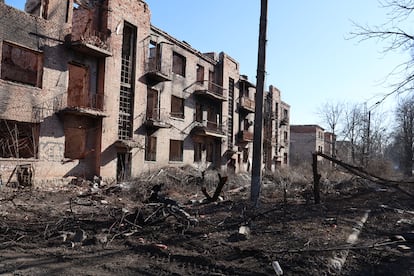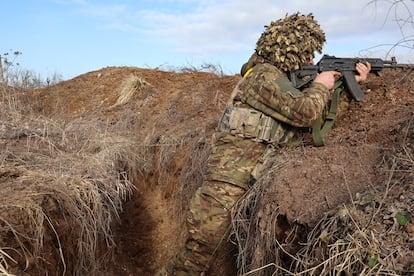Ruins and corpses among the howitzers: Russia prepares its next great siege in eastern Ukraine
After taking Avdiivka, the Kremlin’s troops have begun the offensive on Chasiv Yar, a strategic location on the Donetsk front of the war

Chasiv Yar has ceased to exist. This Ukrainian city on the war front of Donetsk province continues to show up on the maps, but most of the buildings and infrastructure have been destroyed. The civilians who remain there do not exceed 300 people, according to military authorities, when the population before the conflict was 12,000. Chasiv Yar is no longer a place where you can live, except for the thousands of Ukrainian soldiers hiding underground and defending it against what is expected to be the next major Russian offensive in the Donbas region, in the east of the country.
Every few minutes, Russian artillery shells whistle over Chasiv Yar. The exchange of fire does not stop. The only things in sight are military vehicles, as well as soldiers entering and leaving the basements. The hammering of the machine guns is relentless as troops try to halt the constant flight of the enemy drones. Just 2.5 miles (4 km) from town, last Saturday, an anti-aircraft battery welcomed the newcomer: one of its rockets made a vertical ascent to shoot down an Orlan, according to a soldier who was there. The Orlan is the best Russian reconnaissance drone, capable of flying at a maximum altitude of around 16,000 feet (5,000 meters). The hum of the unmanned vehicles chills the blood of the soldiers of the 93rd Ukrainian Mechanized Brigade who are stationed on the second line of the front, 2.5 miles from Bakhmut, a city devastated after eight months of siege and occupied by Russian troops in May 2023.
On the horizon, you can see the skeletons of residential buildings in neighboring Bakhmut. Just ahead is the canal that brought water to the city of Donetsk before 2014, the year that pro-Russian separatist forces took control of the provincial capital. This location was illegally annexed by Russia in 2022. Beyond the canal stretch ghostly forests, torn apart by gunfire and mortars, and fields densely mined by the defending army. Among the minefields, the canal and the Ukrainian defensive positions, several corpses of abandoned Russian soldiers can be seen.

Chasiv Yar is the Kremlin’s next objective in Donetsk, after having taken Avdiivka last week. Multiple indications point in this direction. And the same siege tactic is being repeated: just as in Avdiivka, the Russian artillery is relentlessly punishing, in a preliminary phase, the city’s infrastructure. This much is confirmed by Chuprin, the code name of an officer leading a squadron of the 93rd Brigade. This soldier adds that there are no major infantry assaults taking place, but instead incursions that are being easily stopped by his men, according to his testimony. The Institute for the Study of War, a reference center for analyzing the conflict in Ukraine, has warned since early February that the Russian army is testing the defenses of Chasiv Yar.
This assessment coincides with the message made public this February by the commander-in-chief of the Ukrainian Armed Forces, Oleskandr Syrskyi: enemy troops are punishing the municipality’s first line of defense with bomb drones, nullifying the operations of Ukrainian unmanned aircraft with electronic weapons and conducting assaults with small groups of soldiers supported by superior artillery fire. Top-level military units such as the paratroopers of the Russian 331st Airborne Regiment lead the strategy of testing the defenses of Chasiv Yar on its northern flank, just 1.8 miles (3 km) from the Donetsk water canal.
These same initial stages of the siege were replicated in Bakhmut and Avdiivka, and they are happening in the other most coveted objective at this time of Russian dominance in the war: the city of Kupiansk, in the province of Kharkiv. Kupiansk and Chasiv Yar have in common a high geographical elevation that gives them an important defensive advantage. Whoever controls them has a stronghold suitable for dominating the territory. “We are convinced that we will resist, but if Chasiv Yar falls, the next one is Kostiantynivka,” admits Chuprin, referring to one of the three key cities of the Ukrainian rearguard in Donetsk — the others being Pokrovsk and Kramatorsk. Kostiantynivka is the logistical hub between them.
The Russians want to make progress on the Donetsk front, but they want to do so evenly, rather than advancing more in one sector than in another, explains Chuprin. The logic of this is to prevent your troops deepest into enemy territory from being surrounded. With the capture of Avdiivka, the invader has taken a leap forward and if Moscow wants to leave the front at the same level from north to south on the map, the next assault must be on Chasiv Yar.
Underground command
The dance that marks the artillery fire from both sides is always the same throughout the front. At noon on Saturday, the howitzers of the 26th Ukrainian Artillery Brigade first fired from the vicinity of Chasiv Yar. When they finished, they quickly vacated the spot to avoid being located. Shortly thereafter, it was the turn of the Russian artillery, overwhelming the city with the whistling of their projectiles, followed by explosions and plumes of black smoke if they had hit their target.
One of the battalions of the 93rd Brigade has its command post in a basement. There are six large screens. In two, you can observe, in real time, the movement in the Russian trenches in different sectors of the front. In two others, the location of friendly and enemy positions is reported. Finally, dozens of phone user accounts show up on two other computer screens: they are the commanders at the frontline defense points. If movement is detected on any screen, or if any position identifies the flight of drones, the affected battalion units are notified.
Live images of the front line are taken by Mavic drones, which are normally used for commercial purposes and fly at altitudes of no more than 328 feet (100 meters). Ukraine also has drones that fly thousands of meters high, but in smaller numbers than the enemy. Russia has turned the drone war upside down, especially with the use of the Orlan and the Lancet bomb devices. Dmitro, a soldier stationed in the Donetsk canal, confirms that it is difficult to stay outside the bunkers for a long time without being spotted by Russian aircraft. “Another change from two months ago is that they are using a lot more artillery.” General Oleksandr Tarnavskyi, commander of the Avdiivka front, assured last week that Russia has 10 times more missiles than his own troops, in addition to superior numbers of combatants.
In Chasiv Yar there is a feeling of waiting, that in the coming months there will be another critical moment in the war. Many soldiers wait underground or in trench bunkers. A radio message warns of the takeoff of a Russian bomb drone towards the position where the EL PAÍS correspondent is standing. A Humvee, an American armored infantry vehicle, picks up the group and leaves the area at full speed. The high command of this sector of the front is considering closing media access to Chasiv Yar in the coming weeks, according to a military officer familiar with the situation. It would be one more sign, as happened in Bakhmut or Avdiivka, that his generals are preparing for a new battle to the limit.
Sign up for our weekly newsletter to get more English-language news coverage from EL PAÍS USA Edition
Tu suscripción se está usando en otro dispositivo
¿Quieres añadir otro usuario a tu suscripción?
Si continúas leyendo en este dispositivo, no se podrá leer en el otro.
FlechaTu suscripción se está usando en otro dispositivo y solo puedes acceder a EL PAÍS desde un dispositivo a la vez.
Si quieres compartir tu cuenta, cambia tu suscripción a la modalidad Premium, así podrás añadir otro usuario. Cada uno accederá con su propia cuenta de email, lo que os permitirá personalizar vuestra experiencia en EL PAÍS.
¿Tienes una suscripción de empresa? Accede aquí para contratar más cuentas.
En el caso de no saber quién está usando tu cuenta, te recomendamos cambiar tu contraseña aquí.
Si decides continuar compartiendo tu cuenta, este mensaje se mostrará en tu dispositivo y en el de la otra persona que está usando tu cuenta de forma indefinida, afectando a tu experiencia de lectura. Puedes consultar aquí los términos y condiciones de la suscripción digital.








































